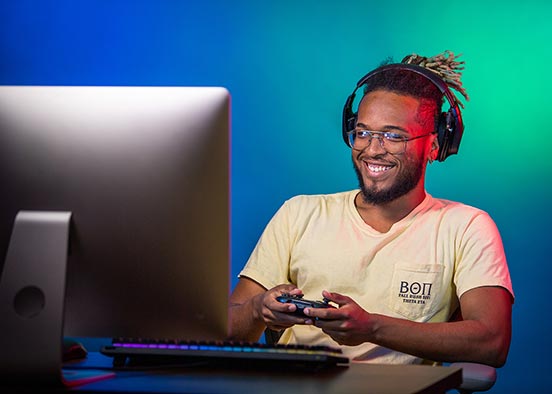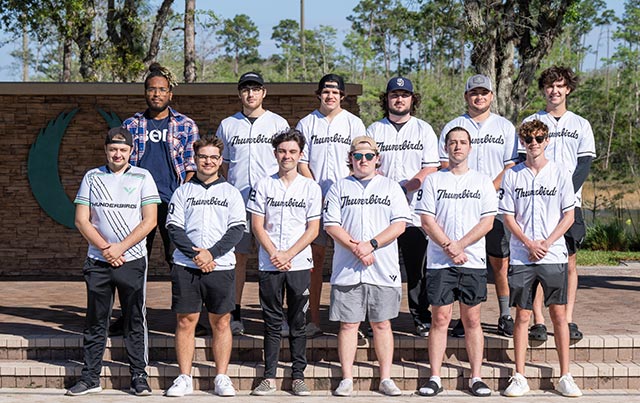When you hear the term “Esports,” what comes to mind?
Is it a cold, dark room with the only hint of light emitted by a computer screen? Perhaps it’s a televised competition, something you’ve briefly noticed flipping through channels.
What about a diverse club of more than 100 Florida Gulf Coast University students?
FGCU offers more than 200 clubs and organizations through Eagle Link that match students with their interests, and one of the more unique is FGCU Esports. Founded in 2018, the club is a refuge for any online gamer who has developed a taste for teamwork, skill development or has a desire to be declared a Thunderbird, as competitive FGCU Esports members proudly call themselves.

The Esports club represents a cross section of the university community. Majors of club members range from business and marketing to computer information systems and engineering. There is no limitation or restriction to join.
In fact, the president of FGCU Esports doesn’t even play.
Zevari Norman, club president and a senior digital media design major, doesn’t compete in any games and describes himself as a “helping hand” to the organization and players. Norman focuses mostly on scheduling and management, and through his work, the Esports club has acquired sponsors such as Game Fuel, an energy drink. Through fundraising, the competitive Esports teams travel to tournaments throughout Florida and out of state.
Norman describes a club member’s experience as completely personalized. “To sign up for the club means that you can join one of two general teams: a recreational or competitive team for any game the member chooses,” he said.
Members play games including Smash Ultimate, Fortnite, League of Legends, Rocket League, and the most popular, Call of Duty.
“Anyone can choose whatever they’d like to play, and they are not restricted to one specific game,” Norman said, “If there is an online game that is not already mentioned in the Esports catalog, that member can start their own team with the game of their choosing.”
Most club meetings are virtual, but that could change as members hope to make Eagle Landing a potential home site for current and future Thunderbirds.
About 60 members are recreational, which means they all use the same game code as they compete with and against each other. For them, there are no hours to log, and recreational play is free of any specified coaching. It complements gamers who like to play strictly for fun.
There are more obligations and different strategies involved in being a competitive player. Depending on which game the member chooses, there is a different level of training and intensity that is required.
When individuals choose to take on such responsibility, they are conferred the title of Thunderbird, affirming their role as a competitive player for FGCU Esports. The most popular Thunderbirds, members of the Call of Duty team, have at least four practices a week.
Bryan “Pedi” Pedisich is a senior marketing major who manages that Call of Duty team. “As a manager, I just keep tabs with the president and the vice president of the club,” Pedisich said. “I direct this team in the direction it needs to go, and I orchestrate whatever goes on behind the scenes.”

Pedisich plays main assault rifle (main AR), which is much like a quarterback in football, as digital media design major Brady “Beecer” Siren — another main AR — explained.
In addition to main AR, other stations include flex and sub. “Main AR, a flex, and a sub — they’re just positions,” Siren said. “Just like in football or baseball, you have left field, center field, right field; and in football you have quarterback, halfback, wide receiver. These are just the positions, but for our specific Call of Duty team.”
Lucas “Copy PP” O’Bryan, vice president, runs three different teams for the club. O’Bryan started the Fortnite team in 2019 and has won more than $4,000 in online tournaments. He trains with his teams (Valorant, Fortnite and Call of Duty) for eight to 10 hours a week. Individually, he’ll train up to 30 hours per week. “I’m both part of the team and a coach,” O’Bryan said. “I can definitely step into both roles.”
Norman continued, “Anyone is welcome to join a competitive team, but they have to ask a manager or coach of that team.” Once accepted, the member is normally put on the “white” level. Through consistent performance and coaching, they’re able to rise to the competitive level and enter Local Area Network (LAN) tournaments.
LAN tournaments are held in large venues with fans in attendance watching competitive gamers battle it out to win for their country, state or — in the case of the Thunderbirds — university. The Thunderbirds have notably stood out at these tournaments; in 2021, they placed in the top six in the Mutineers Summer Invitational and top five at the Independence Community College LAN Invitational.
You don’t have to be a student with a particular major or even a highly skilled gamer to join, but you do have to appreciate and respect the sport. For those who are considering joining, Norman wants everyone to know that the “biggest misconception is that gaming is not a real sport.”
“It takes hand-eye coordination, teamwork and strategy,” he said. “Like chess, you always have to think 10 steps ahead. It is a mental game more than anything else, and it deserves that respect.”
— Alexa Gruber is a senior majoring in communication who’s part of a student internship program coordinated by FGCU Marketing and Communications. Students interested in participating should contact Keith Gibson at [email protected].
